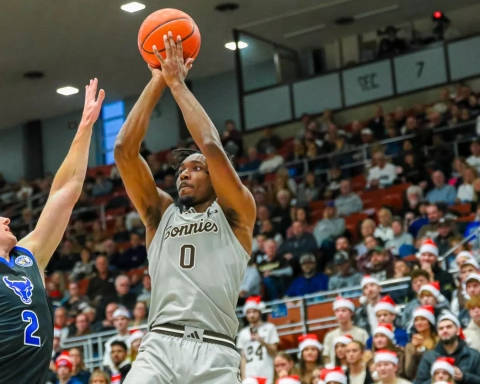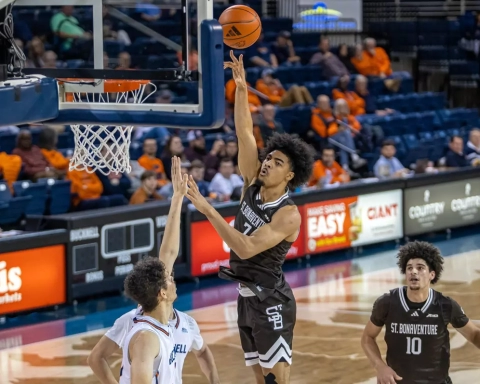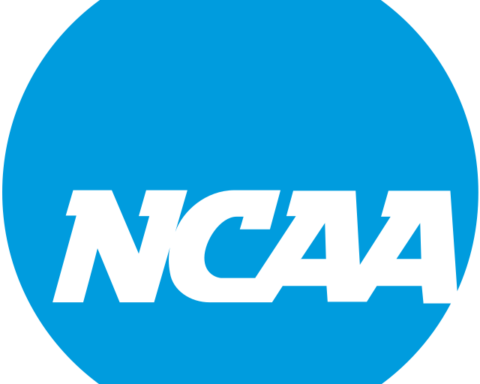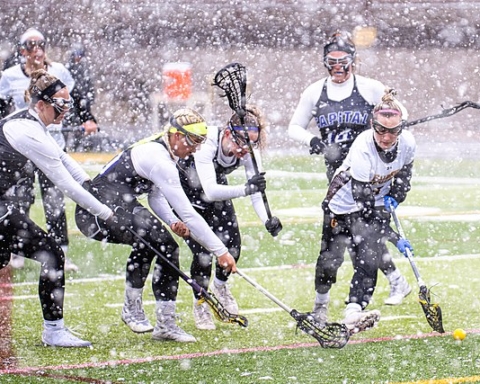Nothing has made the marginalization of the deaf community so apparent to me than this year’s Super Bowl. The game opened with Lady Gaga singing the national anthem, followed by the U.S. Armed Forces chorus singing America the Beautiful, all the while actress Marlee Matlin performed the American Sign Language (ASL) rendition of the performances.
Although those at the game were able to see Matlin’s entire performance on the big screen, viewers at home only saw Matlin at the very start of Gaga’s performance and then nowhere else after that.
This is not the first year that ASL has been performed at the Super Bowl. In fact, the Super Bowl has had a signer perform along side the singer of the national anthem since 1992. However, this is the first year I have actually noticed that there was a signer performing.
Maybe I noticed the signer this year because Matlin played the mother of a deaf family in ABC’s “Switched at Birth” and I immediately recognized her. However, it may also be that, for the first time, I was watching the Super Bowl with a deaf man.
I have not had very many interactions with this man, but when Matlin appeared for the beginning of the Super Bowl you could see that he was excited to watch instead of just read the captions. Perhaps if he hadn’t been there I would not have even noticed there was a signer.
I do not consider myself an expert on the deaf community by any means, however, from watching “Switched at Birth” and reading Oliver Sack’s “Seeing Voices” it seems that the deaf community feels marginalized by the hearing community that engulfs them.
I mean, think about it, if you were to list marginalized groups as you thought of them, would the deaf community even make the top ten? Doesn’t this show that they are marginalized even amongst the marginalized?
The deaf are no different from the hearing. They are intelligent, creative and enjoy many of the same pastimes as their hearing counterparts. The only differences is their hearing is either severely impaired or not present at all. One would think that there would be more interaction between the deaf and the hearing communities being that hearing is the only barrier in the way.
However, the deaf are often sent to all deaf schools and colleges because from a young age they do not feel welcomed or accommodated by the hearing community. Being that there are only three all deaf colleges in the United States, this forces the deaf and their families to be secluded even more from mainstream society.
In addition to this, they can become even more marginalized at these schools. Gallaudet University is one instance in which the deaf community stood up for themselves and pointed out the injustice in their representation in the upper administration of the school.
The protest occurred in 1988 at the university with the student body demanding that the new president of the university be deaf, rather than having an entirely hearing upper administration. One of the four demands of the students was that at least 51 percent of the Board of Trustees must be made up of deaf people
It is entirely possible for the hearing community to learn ASL and will more than likely benefit them in the long run.
We would not only gain understanding of a different culture, we would gain another means of communication amongst ourselves. ASL is a beautiful language and can express so much emotion, meaning and personal voice in a single motion.
We would be able to more easily convey our emotion and intent if we used ASL when we spoke, and it has been shown that children are able to sign before they are able to verbally speak. Along with this, as we lose our hearing in old age we would still be able to communicate and understand those around us.
However, for those that are interested in learning the language, there is not much opportunity or advertisement for it.
More of an effort needs to be made to include the deaf into the conversation of the American experience rather than just pushing them into the spaces we have created for them. To do this, we need to encourage the teaching of ASL to people of all age groups and realize that the deaf are no different than any of us.
Alexis Young is a staff writer for the Bona Venture.
Her email is Youngam13@bonaventure.edu








